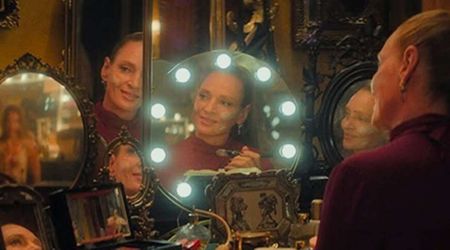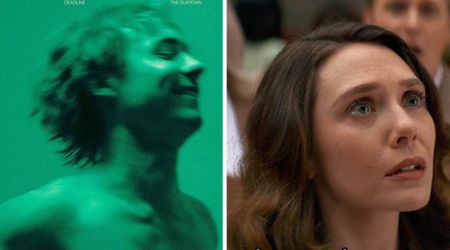'Rebecca': Netflix remake fails Daphne du Maurier's classic novel, so what could have helped make it better?

Daphne du Maurier is known as one of the best writers of gothic fiction and one book that helped sell that is 'Rebecca'. Adapted by Alfred Hitchock in 1940 (the second of three du Maurier books that Hitchcock adapted), 'Rebecca' has never gone out of print. In the book, the unnamed protagonist, Mrs. de Winter (Lily James) gets married to Maxim de Winter (Armie Hammer) and moves to the mansion known as Manderley when she gets married to him after a whirlwind romance in Monte Carlo. However, in Manderley, Mrs de Winter realizes that her husband's life and the lives of those in Manderley are still haunted by the metaphorical ghost of Rebecca -- Max's first wife --, who though the novel is named after, is never actually present in the scenes, except for flashbacks.
Now, a lot goes into what makes 'Rebecca' so great, and to know that one must also realize the time during which the novel was written -- in 1938, just about a decade after women were given the right to vote equally as men in England (where du Maurier is from), Wales, and Scotland. That Mrs de Winter's real name is never revealed is a way in which du Maurier took away her agency -- we only know her as Max's wife and nothing beyond that, and therefore, denying the protagonist the right to her own identity. It is also important to note that the story's perceived villain, Rebecca, is never given her own identity either -- whatever we know of her is what we hear from other people's perspectives. It is also about society's expectations of a woman, be she from the lower class, or a married one.

For Maxim, everything seemed to revolve around him, his last name, and Manderley. He hated Rebecca, yet did nothing to separate from her because of what it would do to his name. He falls in love with the unnamed protagonist but then laments that Rebecca made her lose the "funny, young, lost look" that he loved so much. But here's the problem: it was not Rebecca who did that, it was Maxim himself, by refusing to talk to the protagonist about Rebecca, and yet getting angry every time she was manipulated into mimicking Rebecca by the housekeeper, Mrs Danvers. In fact, even though it was an act of anger, Maxim seemed to consider Rebecca's death a better option than divorcing her.
Netflix's 'Rebecca' is pretty much a faithful adaptation of du Maurier's novel in that it follows the literal presentation of what goes on. What the movie misses, however, is everything that du Maurier presented in between the lines in her book. As such, the Netflix adaptation directed by Ben Wheatley is nothing but a poor caricature of what the story of 'Rebecca' is really about.
So what could have made 'Rebecca' better? Put simply, since 'Rebecca' was a narrative on the status of women in British society in the mid-20th century. There is one remake, if you will, that comes to mind when it comes to accurately reproduce a work of art for the modern age. 'Rebecca' has drawn a lot of comparisons to Charlotte Bronte's 'Jane Eyre' over the years -- the titular Jane Eyre is very much like the second Mrs de Winter, and like Rebecca, Bertha Mason, Edward Rochester's first wife, is never represented herself, but through the voices of other characters. In the end, Bertha sets fire to the Rochester mansion, like Mrs. Danvers (Kristin Scott Thomas) in 'Rebecca'.

In 'Jane Eyre', Bertha Mason is written to be of Creole descent -- the term used for the white European planting class in Jamaica and other Caribbean colonies, often of mixed-race ancestry. Bertha's insanity was often tied to her West Indian background, and in an interview in 1979, the late author Jean Rhys said that, on reading 'Jane Eyre' as a child, she resented the way in which Creole women were represented as mad and that this inspired her to present Bertha's life from an alternative perspective, giving her a fuller history. This was how 'Wide Sargasso Sea' came into existence. The 1966 novel exposed the Victorian prejudices against people of color when it chose to focus on Bertha as the main character, and present Bronte's story by showing Rhys' version of the Caribbean and its culture. In it, the themes of race, class, and gender were explored while being made relevant for the 20th century.
There is also the representation of class differences in society, which the movie tries to depict, but loses its way a little after Mrs de Winter arrives at Manderley. The unnamed protagonist is a lady's companion when we first meet her and it is clear that she is of a much lower class than everyone around her. That Rebecca herself was an upper-class woman is easy to identify in the way that Mrs Danvers speaks of her, compounding the protagonist's inferiority complex against her precedent.

This is where Netflix's 'Rebecca' lacked -- in failing to make the story relevant for the 21st century, and make no mistake, should 'Rebecca' have been presented properly, it would be very much relevant in the 21st century. While women may enjoy a better position in society as compared to 1938, there are still many areas that gender and class discrimination exists -- when it comes to careers, salaries, healthcare and much more. Let's be honest -- Maxim de Winter, is in many ways, the real villain of 'Rebecca', a fact that the Netflix adaptation does not acknowledge or try to put across. Armie Hammer's Maxim is presented as a helpless man who was held hostage by Rebecca, when, in fact, Maxim's two wives are the real hostages in the story.
We can tell with almost complete certainty that du Maurier herself would have been disappointed with the adaptation. du Maurier had complained that no one understood 'Rebecca' when it was first published, that it was about a weak woman under the influence of a strong man. What most people don't know is, of course, du Maurier's own complicated sexuality. The author had relationships with women, however, she was ashamed of her unconventional feelings. In her memoirs, she had also stated that her father had wanted a son, and being a tomboy, she had naturally wished to have been born a boy. Rebecca's unabashed pursuit of relationships outside of her marriage -- thus making her seem to be a dastardly villain -- was perhaps a way of addressing what du Maurier may have been trying to process in her own life.
As such, there were so many different ways in which Netflix should have chosen to recreate du Maurier's book -- one that would have been worthy of the novel as well as the times we live in. Netflix's 'Rebecca' is also much too white for 2020. If only the creators had looked into adapting with a much more diverse audience, the 2020 adaptation would have been much more worthy of our time.
'Rebecca' is now streaming on Netflix.










